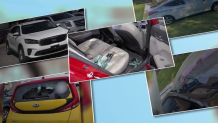A crime wave targeting unsuspecting drivers across the country has now hit many communities across Chicago in a big way.
Thieves are targeting older Hyundai and Kia model cars, all with a major security flaw inside that was brought to light months ago in a series of videos shared on social media.
Records released to NBC 5 Responds by the Chicago Police Department show these thefts have skyrocketed since May, amounting to a third of all vehicle thefts reported citywide in the month of August alone.
Adding insult to injury, one survey suggests that the automakers may have been able to prevent it from happening years ago by installing a device most other automakers were already doing.
The crimes are hitting at a time when used, older model vehicles are in high demand and now, some drivers say they would have never picked these older models if they had any inclination of the serious security lapse contained within.
“I don’t see my car, it’s gone.”
These words are the last thing anyone wants to start their week off saying, but that was the reaction from soon-to-be mom Ashleigh Schlemmer one recent Monday morning.
On Sept. 19, Schlemmer told NBC CT Responds she remembered parking her 2011 Hyundai Elantra outside her apartment complex in Seymore, Conn. and locking it the night before.
Yet, the next morning, all that was left was a pile of broken glass and surveillance video confirming thieves had broken into her car through the window and drove off.
“Not what you want to deal with eight months pregnant,” Schlemmer said, the incident adding a whole new level of stress to her every day.
Feeling out of the loop? We'll catch you up on the Chicago news you need to know. Sign up for the weekly> Chicago Catch-Up newsletter.

Schlemmer had become one of the many victims nationwide that had their older Hyundai or Kia vehicle stolen during a recent spike of thefts in the last several months.
Experts and police believe the origin of this recent boom in thefts can be traced back to videos shared on TikTok, with some users dubbing these crimes as the “Kia Hyundai Challenge.”
Police say TikTok users shared “how-to” videos exposing a major security flaw hidden inside Hyundai models made from 2013 to 2021, and Kia models made from 2011 to 2021.
That flaw is the lack of a device called a standard immobilizer, which prevents a car from starting without the key present.
TikTok said in response to the thefts that it doesn’t condone this kind of behavior and will continue to remove these kinds of videos off its platform.
But experts in the auto industry believe the damage is already done, as they have been tracking these thefts closely in many cities across the U.S., including Chicago.
Matt Moore is the senior vice president of the Highway Loss Data Institute (HLDI), where they study issues such as vehicle technologies and financial issues including this recent theft trend, which he says came as a surprise.
“Vehicles that are targeted for theft tend to be either pricey, powerful, or pickup trucks,” Moore said, “And these targeted vehicles from Hyundai and Kia are not any of those, so it was a real surprise.”
Chicago Hit Hard by Thefts
Sadly, Chicagoans are no strangers to these thefts.
Records obtained by NBC 5 Responds from the Chicago Police Department show once the TikTok trend circulated, the number of Hyundai and Kia models reported stolen across the city grew.
Starting in May, Chicago Police reports show only 46 Hyundai and Kia thefts citywide.
That number jumped to 676 thefts reported in August, the data shows.
In fact, during the month of August, stolen Hyundai and Kia vehicles accounted for one-third of all 2,033 motor vehicle thefts reported citywide, according to the Chicago Police Department’s crime statistics.

Some experts believe the current theft wave may have been preventable.
In a recent HLDI survey looking at vehicles made in 2015, “immobilizers were standard on 96% of other manufacturers’ vehicles” while “standard on only 26% of Hyundai and Kia vehicle models.”
“Our earlier studies show that vehicle theft losses plunged after immobilizers were introduced,” said Moore. “Unfortunately, Hyundai and Kia have lagged behind other automakers in making them standard equipment.”
Neither Hyundai nor Kia responded to NBC 5 when asked for a statement regarding the HLDI’s findings.
Kia told NBC 5 that “all 2022 models and trims have an immobilizer applied either at the beginning of the year or as a running change.”
Hyundai said engine immobilizers became standard on all Hyundai vehicles produced starting in November 2021.
In separate statements, Hyundai and Kia told NBC 5 that while they are “concerned about these specific thefts,” all of their vehicles “meet or exceed federal motor vehicle safety standards.”
The manufacturers also shared that they are working toward a software update for these older models, but no firm release date has been set.
In response to the spike in thefts, Kia said it is working “closely with local law enforcement in affected areas to provide steering wheel lock devices at no cost to concerned owners of steel key operated Kia vehicles not originally equipped with an immobilizer.”
Hyundai told NBC 5 it is offering “a glass break sensor security kit… available for purchase and installation at Hyundai dealerships and Compustar authorized installers.”
Experts like Moore feel installing standard immobilizers in vehicles from the start could be a major step towards preventing these kinds of crimes.
“You never know what's going to become popular from a theft perspective in terms of these random issues. Having standard immobilizers, though, certainly helps reduce the incidence of whole vehicle theft,” Moore said.
Some of these victims could be facing a double-hit, Moore said, as owners who have older vehicles may have already dropped their comprehensive insurance which covers vehicle left.
“If they've dropped their comprehensive coverage and their vehicle [is] stolen, they won't have coverage to pay for that loss,” Moore said.
Back in Connecticut, seconds after Schlemmer had reported her stolen car to police, it was discovered a few miles away, engine running with its doors open, radio on and windows smashed in.
The repairs are expected to cost somewhere between $4,000 to $5,000, Schlemmer said, still shocked that someone would even go to the effort of stealing her car, all for a joy ride.
“I never thought people would just wake up and be like, ‘Hey let’s go on TikTok, find a video, [and] steal a car,’” Schlemmer said.



